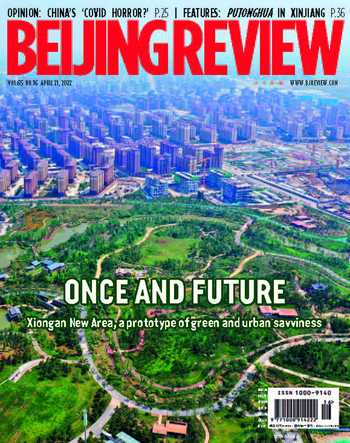OLYMPIC CHAMPION MAKES MASCOT DONATION
2022-04-21
Wu Dajing, a winter Olympic champion, announced in a post on social media he had donated all the money from auctioning off the mascot for Olympic Winter Games Beijing 2022 medalists to charity. He’d received the golden roly-poly panda Bing Dwen Dwen during the games as a souvenir.
At an online auction in early April, the mascot, bearing Wu’s signature, was sold to the highest bidder at a cool 920,000 yuan($144,532).
A further eight posters signed by the athlete were auctioned off, bringing the total amount to 969,500 yuan ($152,308). All auction proceeds went to the China Youth Development Foundation.
Wu won China the gold in the short track speed skating 2000m mixed relay event at the 2022 Winter Olympics in February.
Workers’ Daily April 12
Some Chinese cities have been hit hard by the most recent COVID-19 resurgence. To sever the chain of virus transmission, several of the measures taken have been so tough they might not necessarily help with virus containment, but will somewhat backfire.
The transport industry, considered vulnerable to virus transmission, easily gets in the crossfire. In some areas, expressways, major motorways, even country roads, are blocked; in some extreme cases, other places are denying truckers access to various expressway service areas.
These trucks are carrying goods and groceries urgently needed by residents in lockdown, as well as materials and parts crucial for businesses to sustain normal operations. Many sectors are depending on these logistics for their income—and survival.
In response to this plight, the Ministry of Transport has required that road infrastructure must remain uninterrupted, as any disruptions will severely affect daily life and economic activity in locked-down areas. The nation must curb the virus at the lowest possible cost, instead of having people pay the heaviest of prices: their lives.
Outlook Weekly April 11
In the new era, China has to deal with complicated internal and external situations. Accompanied by a wide range of challenges and risks, the country must do the utmost to maintain political and social stability and ensure a safe and peaceful environment for development.
The concept of safety is no longer limited to life and property, but covers various aspects like political, economic, cultural, social and ecological security.
A peaceful life and a prosperous society are the most basic wishes of the population, and national security therefore features at the top of the country’s agenda. For example, the past five years have seen no new terrorist attacks courtesy of a series of domestic counterterrorism efforts. China always stands ready to promptly deal with subversive and secessionist actions. The country’s political security is well protected in a complicated international framework and rapidly changing domestic situation.
Public security is linked to daily life. Currently, China has one of the world’s lowest murder and general criminal offence rates. Thanks to comprehensive social safety management and a crackdown on cybercrime, transnational crime and various illegal activities posing a threat to social safety, China has managed to establish a safe environment, a real feat in a country of 1.4 billion people.
Economic Daily April 12
The safety of agricultural materials is directly linked to the quality and safety of products. And so this year, seven ministries have joined hands in the fight against counterfeit agricultural materials.
The 2021 statistics showed that sampling qualification rates for seeds, agrochemicals, veterinary drugs as well as feeds were all above 95 percent. But the focus should home in on the online marketing of fake agricultural materials. Given these products are sold on ecommerce platforms, they are circulated nationwide, allowing them to cause extensive damage.
Unqualified agricultural materials can inflict huge damage on farmer undertakings and incomes. If they procure fake seeds, plant output will decline; if they acquire fake veterinary drugs, they’ll stand to lose their livestock. It’s crucial for watchdogs to prevent these counterfeits from entering the market.
Chinese e-commerce giant JD.com announced that Xu Lei, President of JD, will succeed Liu Qiangdong as CEO of the company. Xu will also join JD’s board of directors as executive director.
In September 2021, Xu was appointed president of JD, in charge of the operation and collaborative development of several company business units. Since joining JD in 2009, Xu has held various senior roles, including CEO of JD Retail, chief marketing officer of JD, head of JD Wireless, and head of marketing.
Liu will stay on as chairperson of the board and focus on guiding the company’s long-term strategies, mentoring younger management, and contributing to the revitalization of rural areas.
“In times of crisis, more trade is needed to ensure stable, equitable access to necessities. Restricting trade will threaten the wellbeing of families and businesses and make more fraught the task of establishing a durable economic recovery from COVID-19.”
Ngozi Okonjo-Iweala, Director General of the World Trade Organization, in a remark as the organization published its annual trade statistics and outlook report on April 12
“We call on parties involved in the Ukraine situation to strictly abide by international humanitarian laws, effectively protect women and children, respect and guarantee civilian nature and the safety of facilities such as schools and hospitals, and provide evacuation and medical assistance to women and children in need.”
Dai Bing, China’s Deputy Permanent Representative to the United Nations, at a Security Council meeting on Ukraine on April 11
“The two civilizations (China and Africa) embraced the trinity of mutual cooperation, equal partnership and solidarity to undergird their relations in our turbulent post-liberal international order.”
Peter Kagwanja, Chief Executive of the Nairobiheadquartered Africa Policy Institute, in a commentary published in daily newspaper The Nation, on April 10
“The black sites are… typical examples of the U.S. trampling the rule of law and violating human rights.”
Zhao Lijian, spokesperson for China’s Foreign Ministry, at a regular press briefing on April 8, commenting on U.S. Central Intelligence Agency’s “black sites” established in many countries, where alleged terrorists are secretly placed in arbitrary detention and confessions are obtained through torture
